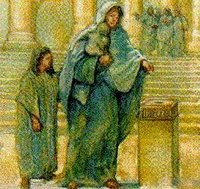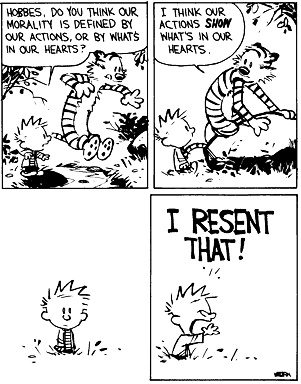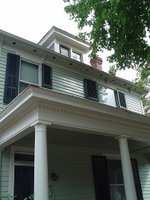It rained most of the day today, so I'm glad we're here at the farm and not walking. Also, it's given us good time for talking. I found a duck egg on the lawn this morning and scrambled it up with some eggs from their chickens, and Bill made pancakes from scratch, and we sat around the kitchen table talking about Bill's adventures with Plowshares. And adventures in the courts and jails, where he landed because of the Plowshares actions. It was the best presentation I've heard so far about this kind of activism, and the faith behind it. Mostly, I think, because Bill simply spoke of his spiritual quest and personal experiences rather than ideology. His enthusiasm and sincerity impressed me most of all.
I strongly agree with the need to challenge the wrongs in our society, especially those of the powerful. And I also agree that we should expect persecution for this, from those whose deeds we uncover as evil (as Jesus said, "The world hates me because I testify that its works are evil" Jn 7.7).
But I'm not quite satisfied with the way most "direct action" folks put these together. They do speak out against injustice, and they do suffer and go to jail—but is it really because they "testify that its works are evil"? If so, why the need to disrupt traffic, or cut fences and enter military bases, or bang on submarines with hammers? It seems that it's these actions that get them arrested, not their testifying. (Yes, Jesus flipped tables once in a fit of anger, but he didn't make a habit of it, and when he was arrested and tried it was not for flipping tables.)
I also wonder if in this activism there isn't a certain desperation. A feeling that evil is winning and we have to do something, somebody's got to do something, or all will be lost. I wrote a story related to this, based on accounts of the death of a well-known Christian activist:
To the end
The small room was crowded. So many people had gathered around the bed that she couldn't get any closer than the doorway, but it was exciting just to be here. She only worried that she might not be able to hear what he said.
But it was surprisingly quiet, even with all the people packed in, shoulder to shoulder. Then the priest began to pray over him. She bowed her head and listened intently; she wasn't Catholic but she found herself very interested in the "anointing"—it used to be called "last rites." The man on the bed was a Catholic she looked up to, and that made her want to understand the meaning in this religious practice that he'd requested, foreign as it was to her. Everything that was happening in this room seemed full of meaning and significance, and everyone seemed to sense it. She didn't want to miss anything.
Soon she recognized in the priest's words, not a prayer about dying, but a prayer about healing and life. But she knew the people here weren't looking for a miracle. Ever since he'd decided to stop taking chemotherapy they had been bracing for his death, and it seemed to be close now. She knew it was going to be a terrible loss for them. He had been the heart of this community and their peace efforts, an inspiration and guide, a model of fearlessness and compassion. She couldn't remember how many times he'd been in jail for demonstrations against war, the draft, nuclear weapons and nuclear waste, against globalization—he'd never flinched from speaking the hard truth to those in power, and he'd paid the price for that. His life would certainly be remembered. She just hoped they'd be able to go on without him, and live up to his example. The priest finished and it was quiet again.
Then someone helped him sit up a little and he began to speak, and she felt them all press in around the bed. His words came slowly and distinctly. As if he'd been preparing this in his head for days and was now reciting his final message to them and to the world. His voice was weak, but she could hear every word.
"I die among my community and family," he began. "My beloved wife Catherine, and friends, local, national and even international, including some who cannot be here now because they have been imprisoned for speaking the truth. This community has always been a life-line to me. I die with the conviction, held for over thirty years, that nuclear weapons are the scourge of the earth; to mine for them, manufacture them, deploy them, use them, is a curse against God, the human family, and the earth itself.
"We have already exploded such weapons in Japan in World War II and the equivalent of them in Iraq, in Yugoslavia, and in Afghanistan, all in the past decade. We left a legacy for other people of deadly radioactive isotopes—a prime counterinsurgency measure. For example, the people of Iraq, Yugoslavia, Afghanistan and Pakistan will be battling cancer, mostly from depleted uranium, for decades. In addition, our nuclear adventurism over 57 years has saturated the planet with nuclear garbage from testing, from explosions in high altitudes—four of these—from 103 nuclear power plants, from nuclear weapons factories that can't be cleaned up... and so on..." His voice faltered. He tried to clear his throat, coughed, then the words came again. "Because of myopic leadership, of greed for possessions, a public chained to corporate media, there has been virtually no response to these realities..."
The voice was choked off in a gurgle and again the coughing shook his weakened body. His utter helplessness brought tears to her eyes. His wife put an arm around his shoulders, but he couldn't continue. Someone else helped him lay back. There was a sympathetic murmur and people started backing out of the room. She tried to catch what they were saying. Apparently he was just too tired now; they would try to come back later to hear the rest of what he wanted to say.
But there was no later. He died that night. She had only been home a few minutes when she got the phone call.
When she hung up, she turned off the light and sat down on the floor and closed her eyes. First there was only the darkness. Then the question. Why did it have to end this way? He was such a strong man, a fighter—and he had fought to the very end. Just as he had always told them, he never gave up. So why did he have to be dragged down and choked into silence like this? Not by enemies—who hated and feared him, and in their hatred and fear demonstrated their respect for him—but by disease, his own body turning on itself, without cause or sense. Without respect for who he was. Without respect for the man or his message, what he was meant to say to the world, what they needed to hear from him. What she needed to hear from him.
She knew that in the coming days the others would say that his spirit lived on in them. That his death didn't mean the death of their movement, but that his fighting to his last breath only inspired them to fight even harder. But she didn't feel inspired. She felt cheated. Why, God, couldn't you just let him finish? Why did he have to be cut off that way, gasping to say one more thing?
Why couldn't you let him say, "It is finished"? Is that too much to ask, God? Didn't he follow in the footsteps of your son?
Her tears fell into her hands, and she noticed they were trembling. She couldn't stop it. So she reached for the bible on the table beside her bed, opening it at random. She knew it was a silly, superstitious habit, but she'd done it ever since she was a child. It fell open to Isaiah. She read, "He was oppressed and afflicted, yet he did not open his mouth; like a lamb that is led to slaughter, and like a sheep that before its shearers is silent, so he did not open his mouth..."
Jesus standing silent before his accusers, the soldiers, the rulers; not struggling to say one more thing, but silent. "It is finished" came out of that silence. She suddenly knew that. What she didn't know was whether she could ever bear that terrifying silence herself.














 subscribe
subscribe